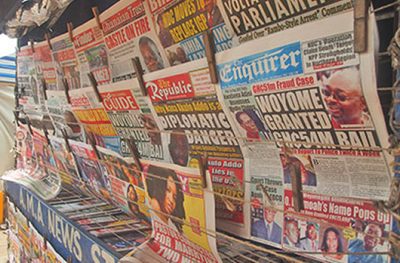By
Adisa Amanor Wilks
It will surprise many that as early as 1992, Ghana still had the Newspaper licensing law which required newspaper/magazine publishers to obtain a license from the government.
It’s been a long road to travel for the media in Ghana. These days you virtually need nothing to publish anything. Ghana’s Constitution guarantees freedom of expression in Chapter 5 of its 1992 Constitution.
For many young Ghanaians, especially those born after the coup era, a repressive media landscape cannot be envisaged in the slightest. But yes, Ghana once had a very controlled media environment.
The repeal of Ghana’s Criminal Libel Law in 2001 opened the way for media pluralism and liberalisation. Undoubtedly, journalism has played a significant role in safeguarding Ghana’s constitution and other democratic tenets.
All persons shall have the right to – (a) freedom of speech and expression, which shall include freedom of the press and other media -(Article 21(1)(a))
In the same Constitution (Chapter 12) – the individual rights of media practitioners and media houses is protected from censorship, and allows the media to carry out its function freely.
The constitutional provisions even go further to guarantee the watchdog role of the media, with Article 162(5) noting that:
all agencies of the mass media shall, at all times, be free to uphold the principles, provisions and objectives of this Constitution, and shall uphold the responsibility and accountability of the Government to the people of Ghana.
There are about 200 official FM radio stations, 12 private television stations and hundreds of newspapers. Figures from the National Communications Authority puts the number of mobile phone subscribers in Ghana at over 27 million, with MTN and Vodafone taking the biggest share of subscriptions.
Thankfully, the state no longer controls the media. Journalists are no longer arrested and detained for their editorial decisions.
This is all good and welcome news for the many who have fought to see a free press in a democratic Ghana. However, with liberalism comes challenges which some have even described as “dangerous” to the very democratic structures that a free press has helped to build.
Ghana’s constitution has protected media freedom and access to information and any attempts at curbing, or seeking to curb or control the country’s media would be a contravention of the law.
The comments were made by the immediate-past Chairman of the National Media Commission, Ambassador Kabral Blay-Amihere at a public forum to discuss new findings of Ghanaians’ reliance on news media.
The survey conducted by the National Commission for Civic Education (NCCE) found that interests in newspapers are on a steep decline in Ghana – only 1.5% rely on newspapers for information.
More than half (62.9%) use radio as their primary source of information because they found it credible and neutral. On television, the study found that one in four Ghanaians preferred that medium.
Surprisingly, very few people depend on digital media for news. which is in sharp contrast to global trends.
Only 6.4% of Ghanaians use the internet and social media as their primary source of information.
More than 2000 Ghanaians adults drawn from all ten regions took part in the survey.



No Comments Yet!
You can be first to comment this post!